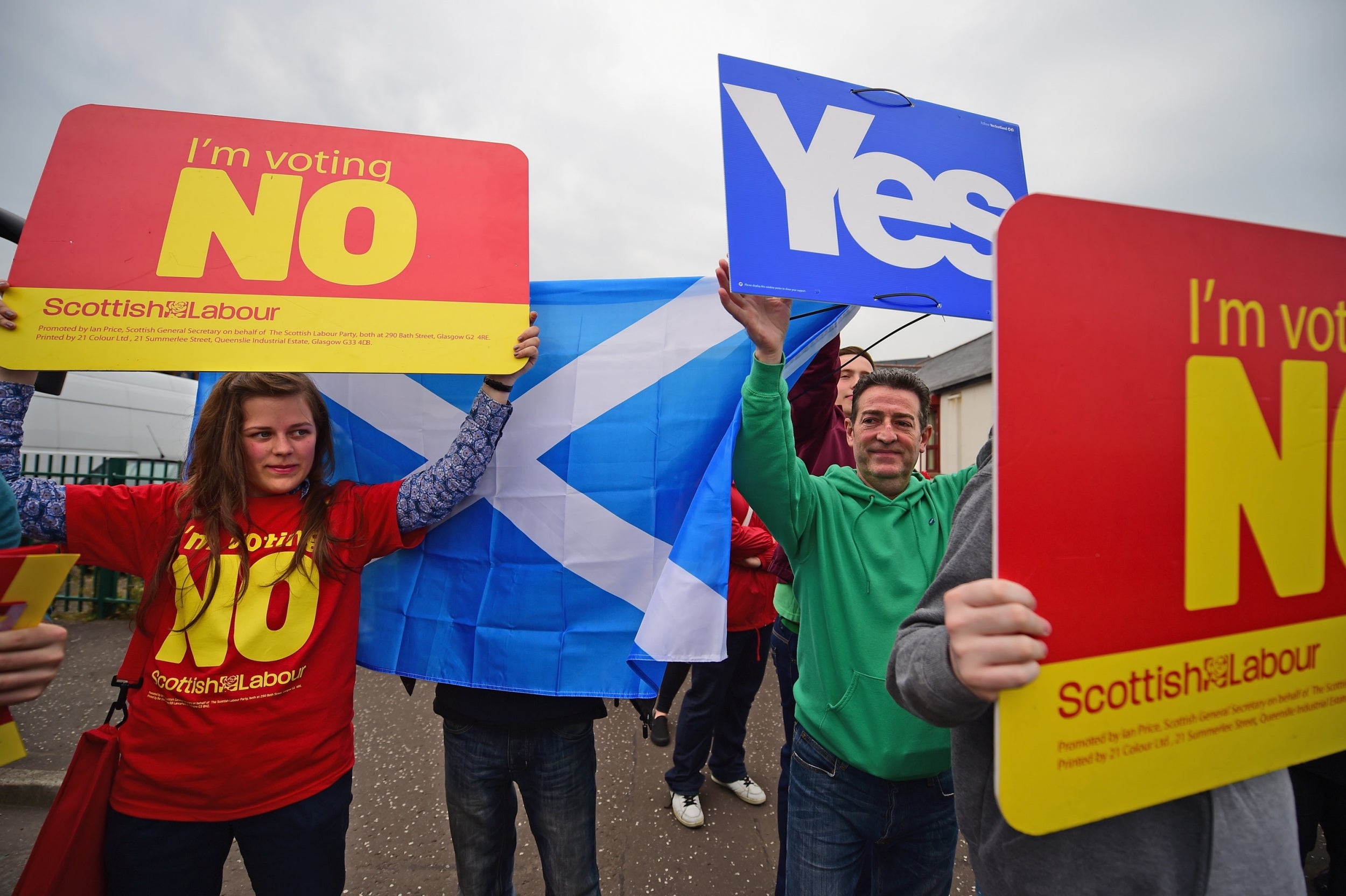Would a no-deal Brexit lead to Scottish independence?
Like the Irish Question before it, the Scottish Question is becoming intractable, and so much so that a popular vote would end up settling nothing and making matters worse, writes Sean O’Grady


While there is nothing inexorable or inevitable about politics, the growing probability of a “no-deal”, “clean”, “WTO terms” Brexit would seem to be pushing Scottish opinion closer to the idea of Scotland leaving the union. The support for remaining in the UK in the first independence referendum in 2014 was 55 per cent to 45 per cent. Now that position is close to being reversed. All the signs are that the Scottish National Party (SNP) will win its seventh victory in a row (counting all contests) at the elections for the Edinburgh parliament next May, with an overall majority of seats and votes. The first minister, Nicola Sturgeon, has made it clear that the national issue will be placed at the forefront of the SNP campaign, and she has promised to put a referendum bill before the Scottish parliament.
As when the SNP won a mandate to seek a referendum in the Scottish election of 2011, they would possess a strong moral case, which was conceded by the then prime minister, David Cameron. Besides, it is not for the Tories or the SNP to declare the 2014 referendum “once in a lifetime” – that is a mere political slogan. The substance of Scottish sovereignty lies with the people rather than any assembly or parliament, because Scotland remains a nation within the UK, and because the 2016 referendum shows how popular will now overrides the traditional sovereignty of parliament.
The advent of hard Brexit would arguably change everything, as would a landslide SNP victory next May. Between 2011 and 2014, Cameron set the constitutional precedent for granting a vote, for better or worse. The SNP could also pass a bill mandating negotiations with Westminster to grant a referendum, in an intermediate stage that would add pressure. Alternatively, they could organise their own “illegal” referendum, as happened in Catalonia, or they could call for civil disobedience and refuse to cooperate with Westminster and Whitehall (though Ms Sturgeon seems against such radicalism). Any and all of these questions may end up with the UK’s Supreme Court.
The momentum, then, certainly seems to be with the SNP, and that counts for a good deal – though not everything, of course.
The UK government can still politically claim that the Scottish nationalists said they would respect the outcome of the 2014 result as a “once in a generation vote”. Legally, the right to simply say “no” to IndyRef2 under the terms of the Scotland Act almost certainly rests solely with Westminster. Boris Johnson and the Aberdonian Michael Gove can simply put their fingers in their ears and chant “once in a generation”. Politically, they argue that independence is an irrelevance in a pandemic, and that the SNP would have to join the euro and give up Scottish fisheries if it rejoined the EU. The stalemate about another independence referendum could drag on for the duration of this government, or beyond, depending on what a Labour government in Westminster would do.
However, there is a new option that is being talked about by the likes of Tory former chief whip Andrew Mitchell and Labour ex-chancellor Alistair Darling, who led the successful pro-union campaign in 2014. That third way is to hold a referendum on the actual terms of a Scottish exit from the UK, what you might call “Scexit”, rather than on the abstract notion of the principle of independence. There are obvious parallels with the arguments about a “final say” “people’s vote” on Brexit.
Although dismissed by official Tory and SNP sources, as a compromise it has elements that could attract both sides, though it would be a bit of a gamble for both.

For unionists, it would make an inevitable referendum winnable. If the “done deal” presented to the people of Scotland was sufficiently unpalatable, maybe because of relatively minor impacts on various interest groups, a narrow majority for independence could be eroded. There are said to be some analogies with the successful campaign to retain the monarchy when Australia set out the specific forms of its proposed republic and presidency in the 1999 referendum.
Nationalists, especially if the courts resist their claims for a “proper” referendum, might accept this version as the best chance they have of such a vote before the anger aroused by Brexit subsides and a more friendly Labour Party takes power nationally. Even the SNP’s most loyal fans would concede that in a democracy no political party holds office for ever; if the SNP reverted to being the largest single party in a hung parliament at Holyrood, they could not pass a referendum bill. Johnson, ironically, stands as their best argument for independence.
The more substantive argument is what the “done deal” might amount to. It would be an odd package, as the UK government would be incentivised to try to impose the harshest of terms – tariffs on Scottish goods, restrictions on Scottish service companies (eg banks and insurance firms) operating in the rest of the UK, restrictions on freedom of movement of labour, and so on. It would be bogus, compared with a real world deal, and a kind of false prospectus.
On the other side, the “done deal” with the UK would say nothing about what Scotland’s deal with the EU would be like, in detail. Nor would it say anything about the future course of UK government policy towards Scotland, such as any attempt to roll back devolution or reduce the budget settlement.
Of course, as we almost had with Brexit, Scexit could be the subject of two votes, one on the principle of independence, and the second on the terms of leaving the UK. Then again, by 2024, it would amount to a decade of wrangling over the constitution, and if the result of an independent referendum was, say, 48 per cent to 52 per cent, either way, it would mean years more bitter resentment and division. Like the Irish Question before it, the Scottish Question is becoming intractable, and so much so that a popular vote would end up settling nothing and making matters worse.
Join our commenting forum
Join thought-provoking conversations, follow other Independent readers and see their replies
Comments
Bookmark popover
Removed from bookmarks